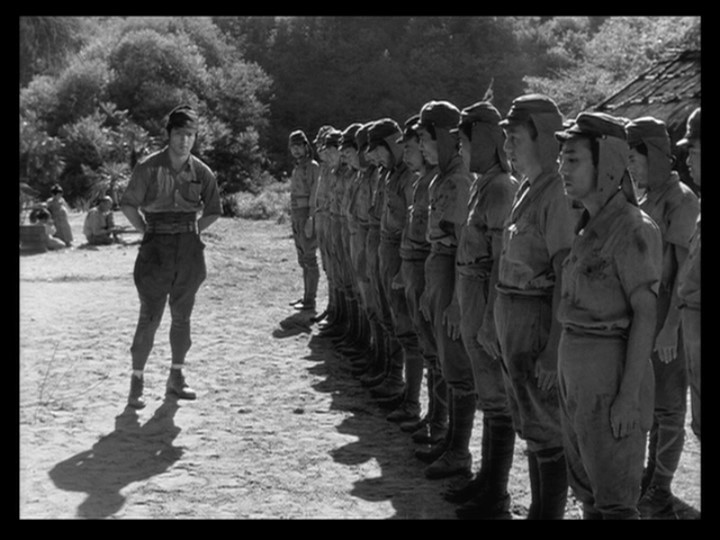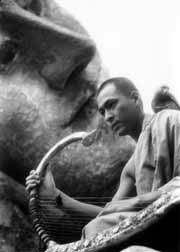 director: Kon Ichikawa
director: Kon Ichikawa
Starring: Rentaro Mikuni, Shoji Yasui,
The Harp of Burma aka The Burmese Harp is a Japanese anti-war film originally produced in 1956. It is about a Japanese soldier who travels across Burma disguised as a monk during the aftermath of the Japanese surrender. Based on a children’s novel by the author Takeyama Michio, it won many awards and accolades at the time of it’s release including an honorable mention in the Venice Film Festival and the first ever San Giorgio Prize after tying with the winner. The movie itself is kinda a tearjerker so if you like sad movies about departures you will like this one.
Summary:
The setting is Burma 1945. A platoon of Japanese soldiers is patrolling the jungles of Burma. Led by a Captain Inouye that used to be a music teacher, they are a rather strange bunch who enjoy singing English ballads in four part harmonies during their breaks. One of them, a corporal named Mizushima, accompanies them on the Burmese harp.
While camping out in a Burmese village, the soldiers learn that the war is over when their camp is peacefully overtaken by Allied forces. Most of the group is shipped back to a prison camp to be processed and sent home.
Before leaving Captain Inouye sends Mizushima on a volunteer mission to help negotiate the surrender of Japanese forces further north.
Mizushima goes on the mission, but when he arrives the soldiers refuse to surrender and, except for the private, they are all killed in the ensuing battle. The private flees the battlefield, traveling across Burma disguised as a monk. One day he spots his old platoon on the road returning to the prison camp from a work detail but he does not acknowledge them.
Back at camp, Captain Inouye is convinced that the monk they saw is Mizushima. He and his men organize an elaborate way to communicate with Mizushima asking him to return home with them using a parrot and song.
What I liked about this movie: Acting-wise, there are some real gems. Shôji Yasui gives a very sensitive performance as private Mizushima, a man who is torn between his desire to return home and the fact that he is forever changed by the experience of war. Rentaro Mikuni is very likeable as Captain Inouye. He gives a moving speech at the end of the film while reading a letter from his fellow soldier and friend. There are many other performances that are quite interesting including the other soldiers in Mizushima's platoon and an old Burmese lady who helps the soldiers in the prison camp.
Acting-wise, there are some real gems. Shôji Yasui gives a very sensitive performance as private Mizushima, a man who is torn between his desire to return home and the fact that he is forever changed by the experience of war. Rentaro Mikuni is very likeable as Captain Inouye. He gives a moving speech at the end of the film while reading a letter from his fellow soldier and friend. There are many other performances that are quite interesting including the other soldiers in Mizushima's platoon and an old Burmese lady who helps the soldiers in the prison camp.
Summation:
The movie is really poetic in it’s storytelling in a way that is quite endearing and almost surreal at times.. The idea of a group of soldiers who sing in chorus while on break from patrol might seem pretty preposterous considering that they would be ambushed and killed in a second. However, if one is open to the fact that the movie is more of an allegorical piece than a realistic one a whole experience opens up. Early on in the movie there is a spectacular scene where the soldiers are serenading Ichikawa is a very good storyteller and his visuals are very beautiful and ghostly. The movie is in black and white and I would love to see the color version that was produced in 1985.
Ichikawa is a very good storyteller and his visuals are very beautiful and ghostly. The movie is in black and white and I would love to see the color version that was produced in 1985.
Other movies I would recommend if you liked this one are:
In the Mood For Love, The Burmese Harp(1985), The Thin Red Line, The Deer Hunter.


No comments:
Post a Comment